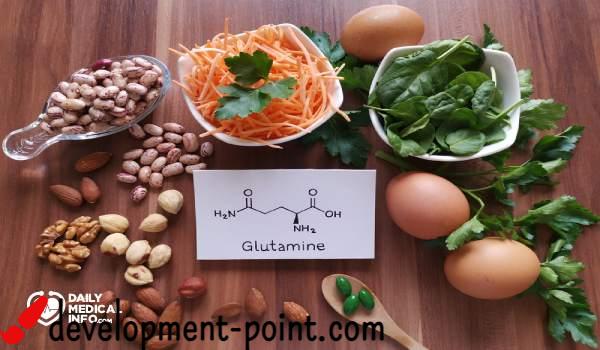What is gluten? Does it have health benefits?
Infection with some digestive problems makes it difficult to digest some food materials and components, and thus avoid them, and among the most famous substances associated with some digestive problems is gluten, so what is gluten? What foods contain gluten? Does it provide any health benefits to the body? Find out the answers to these questions and the answers to some of the other most popular questions related to this topic through the following paragraphs.
What is gluten?
Gluten or gluten are stored proteins, or what is scientifically known as prolamins, found naturally in grains such as wheat or barley. Gluten offers a variety of benefits, and is the reason behind the smooth, appetizing texture some grain-based foods have.
When food containing gluten is heated, the gluten proteins form a lattice, which expands and traps the gas, allowing fermentation to occur or moisture retention in baked goods or similar products. Because of these properties, it is often used as an additive to improve texture and retain moisture in many preserved foods.
It is usually found in the following:
- grain products.
- Processed products that contain wheat.
- Other foods and beverages, such as malt vinegar and soy sauce, gravy and some liquid salad dressings, flavored chips and some spice blends.
The benefits of gluten
Gluten is associated with wheat and foods that contain wheat, and these foods represent a large part of different diets, and despite the controversy surrounding whether gluten is safe and beneficial or not, gluten, according to many studies, provides the body with various benefits, and these benefits Below:
- It is usually found in foods (wheat products) that contain many nutrients for the body such as proteins and fibers, and avoiding these foods without finding an alternative, and without a health reason, may deprive the body of important nutrients.
- According to a study conducted on a large group of people who do not suffer from Celiac diseaseThe researchers did not find any long-term relationship between the use of gluten products and the risk of heart disease. Rather, the study found that those who avoid gluten without a medical reason have an increased risk of heart disease.
- people who take Whole grainswhich contain gluten, have a significantly reduced risk of stroke and type 2 diabetes.
- Gluten can act as a chemical that feeds the good bacteria inside the body, as some components of wheat stimulate the colon-friendly bifidobacteria that are normally found in the healthy intestine, and any change that occurs to these bacteria is linked to digestive diseases such as irritable bowel syndrome and rectal cancer.
Foods that contain gluten
Foods made from wheat are the foods that contain the highest percentage of gluten, and wheat flour is added to many foods. If you want to avoid gluten, be sure to read the ingredients of the products well before using them. The most common foods that contain gluten include:
- Bread of all kinds, except for those classified as gluten-free.
- Baked goods such as cakes, biscuits, donuts, pies, pancakes and waffles.
- Pasta, all types of wheat pasta contain gluten, such as spaghetti, fettuccine, lasagna, ravioli, and others.
- Breakfast cereals. Many types of breakfast cereals contain gluten, but not all.
- Entertainment, popular fast foods such as crackers and some types of chips contain it.
- A beer drink, as it is made from barley rich in gluten, and some other types add wheat during manufacturing.
- Gravy. Some types of broth, whether liquid or powder, used to flavor food contain gluten.
- Canned soups. Most canned soups use wheat flour to thicken the soup, so be sure to read the ingredients.
Does oatmeal contain gluten?
Pure oats are gluten-free and safe for people with a gluten intolerance, but gluten is often mixed with oats, because oats are usually made in the same places as other gluten-containing products such as barley, wheat, and rye.
Studies have indicated that most people with Celiac disease or who suffer from wheat allergy can eat between 50 to 100 grams of pure oats, without any harmful side effects.
And some countries advise introducing gluten-free oats into the diets followed, as some studies indicated that people with Celiac disease who live in these countries have stronger intestines and are able to heal more quickly, compared to countries that do not recommend the use of oats.
Some common questions
Do lentils contain gluten?
Lentils are naturally gluten-free foods, and it is usually safe to eat for people who are sensitive to gluten, but in some cases lentils may be mixed with gluten-containing substances, but usually these mixtures are in a small percentage, so if you do not suffer No problems when eating very small amounts of gluten, you can eat all kinds of lentils without any worries.
Does rice contain gluten?
All types of rice are gluten-free, and rice is an excellent choice for people with gluten sensitivity and those with Celiac disease. But it should be noted that some rice recipes may contain gluten, because they are usually made with gluten-containing ingredients, such as rice cooked with seasoned sauces, so caution must be exercised.
Does bulgur contain gluten?
Yes, bulgur contains gluten, as it is made by boiling wheat, then drying and grinding it, so in the event of celiac disease or gluten sensitivity, it is not recommended to eat bulgur, and it can be replaced with rice.

